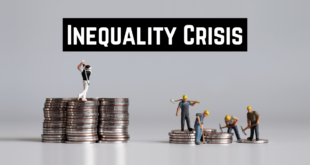Who pays for Trump’s tariffs? You will! .[embedded content]
Read More »What is wrong with game theory
What is wrong with game theory Back in 1991, when yours truly earned his first PhD with a dissertation on decision making and rationality in social choice theory and game theory, I concluded that “repeatedly it seems as though mathematical tractability and elegance — rather than realism and relevance — have been the most applied guidelines for the behavioural assumptions being made. On a political and social level, it is doubtful if the methodological...
Read More »Daniel Waldenström — Sveriges egen Dr Pangloss
Daniel Waldenström — Sveriges egen Dr Pangloss Idag presenterades LO:s årliga rapport om inkomstskillnader i vårt land — Makteliten: i raketfart från verkligheten. Den visar att näringslivets direktörslöner fortsätter att dra ifrån rejält och idag ligger på en historiskt hög nivå. Den genomsnittliga inkomsten för vd:arna vid de 50 största svenska företagen motsvarade år 2023 mer än 70 industriarbetarlöner. Men för vår egen Dr Pangloss, ekonomiprofessorn...
Read More »The Pygmalion syndrome and the failings of modern economics
The Pygmalion syndrome and the failings of modern economics As Lars Syll wrote here last month, too much of the profession “has since long given up on the real world” and is happy to investigate the “thought-up worlds” of unrealistic economic models. Too much attention is focused on how the parts of the model fit together, rather than on how well the models fit with reality. But how can critics communicate these problems effectively? Especially to those...
Read More »Dynamic Programming for Dummies (student stuff)
Dynamic Programming for Dummies (student stuff) .[embedded content] Dynamic programming is a cornerstone of optimal control theory. By recursively breaking down complex problems into smaller, more manageable subproblems, it serves as a powerful tool in economics. Economic analysis often involves decisions with long-term consequences, and dynamic programming helps model how different agents make optimal choices when each decision depends on the current state...
Read More »Weekend read: Keynes’ critique of econometrics is still valid
from Lars Syll Mainstream economists often hold the view that Keynes’ criticism of econometrics resulted from a sadly misinformed and misguided person who disliked and did not understand much of it. This is, however, nothing but a gross misapprehension. To be careful and cautious is not the same as to dislike. Keynes did not misunderstand the crucial issues at stake in the development of econometrics—quite the contrary. He knew them all too well and was not satisfied with the validity and...
Read More »Knapsack problem (student stuff)
Knapsack problem (student stuff) .[embedded content] And, yes, there is a strong connection between the knapsack problem and Bellman’s principle of optimality through dynamic programming, which leverages the principle of optimality to break the problem into smaller subproblems and build up the solution …
Read More »Here we are
from Peter Radford Random thoughts on day one of America’s war on the world. This is my way of summarizing, it is not definitive by any means! I wrote in haste. Here’s a quote to get us started: “What made fascism attractive in Europe and elsewhere was its combination of national autarkic aims, militarism, statism, and a glorification of technology, which suited the inclinations and interests of military rules and modernizing autocrats.” [Osterhammel and Peterson; “Globalization, A...
Read More »Om ‘statsbudgetpolis’ och otillräckliga räntesänkningar
Om ‘statsbudgetpolis’ och otillräckliga räntesänkningar Sällan eller aldrig har man anledning vara nöjd med ekonomijournalistiken i press, radio och television. Ytterst få ekonomijournalister och börsanalytiker tar sitt jobb på allvar och bedriver ekonomisk journalistik värd namnet. De flesta av oss har därför sedan länge gett upp. Synd bara att allmänheten ska behöva nöja sig med det tyckmyckentrutade nonsens näringsliv och borgerlighet helt oemotsagt får...
Read More »How inequality causes financial crises
from Lars Syll One way that inequality precipitates debt bubbles begins with “relative deprivation.” This concept concerns the discontent people feel when they compare their socio-economic status, measured by income, wealth, consumption, or other indicators of perceived economic welfare, with that of their richer counterparts. Economists have suggested several ways that this discontent may translate into indebtedness. One theory holds that people of a given income level may try to...
Read More » Heterodox
Heterodox





